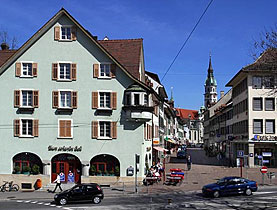Switzerland moves up as attractive tax location

Switzerland could benefit as a favourable tax location as other European countries increase their maximum income fiscal rate to counter the global economic downturn.
A study by tax experts at KPMG found Switzerland moving up four positions to 13th place in an international comparison of 86 countries around the world.
Income tax has continually fallen over the past seven years, but a countertrend is becoming visible under the pressure of the difficult economic situation.
Ireland was the first country in Europe to significantly boost its maximum income tax levels, followed by Iceland. Similar moves are underway in Britain.
“Since Switzerland shows no signs of increasing its maximum income tax rates, the international growth of the country’s attractiveness could be further strengthened,” said the report, which was published on Monday.
A comparison ranks Switzerland 13th, behind several eastern European countries, which have a flat tax system, as well as the British Channel Islands, Finland and Cyprus.
The average rate in Switzerland last year was 33.7 per cent, up 0.2 per cent on the previous year.
The authors of the study also point out that ten out of the 26 Swiss cantons which enjoy a wide-ranging autonomy, have introduced tax cuts since last year.
“A direct comparison across countries and cantons shows that some of the best European locations for private individuals are in Switzerland,” the report says.
Top 20 locations
Six cantons, including Zug, Schwyz, Obwalden, Nidwalden, Appenzell Inner Rhodes and Uri kept their rates below 30 per cent. Only one canton, Bern, increased it maximum rate.
Overall, nine cantons are among the top 20 locations in Europe, according to the report. “Switzerland retains its competitive strength,” it concludes.
In comparison, residents in the European Union continue to pay the highest rates of income tax in the world.
Unchanged from last year, Denmark has the highest income tax rate in the world charging 62.3 per cent on the top slice of high incomes, while Bulgaria comes out top with just ten per cent.
In the Asia-Pacific region, taxpayers in Hong Kong enjoy a 15 per cent rate and – leaving out the tax-free Cayman Islands – Paraguay leads the countries in Latin America with an income tax rate of ten per cent.
Lump-sum tax
In February voters in Zurich decided to abolish tax breaks for wealthy foreigners.
The system, known as lump-sum tax, is not based on income and wealth, but on a minimum amount – generally the equivalent of five times the annual rent or the rental value of the house the taxpayer lives in.
Only foreigners with a residence permit are eligible for lump-sum taxation. There are considerable differences in the lump sum tax levied by the cantons and the local authorities across the country.
More than 4,100 wealthy foreigners with residency status in Switzerland benefited from special tax treatment, according to 2006 official figures.
Most beneficiaries lived on Lake Geneva and in the Valais, Graubünden and Ticino regions.
Urs Geiser, swissinfo.ch and agencies
1%-10%: Bulgaria
11%-20%: Czech Republic, Lithuania, Romania, Slovakia
21%-30%: Cyprus, Estonia, Latvia
31%-40%: Britain, Finland, France, Greece, Hungary, Luxenbourg, Malta, Poland
41%-50%: Austria, Belgium, Germany, Ireland, Italy, Portugal, Slovenia, Spain
50%+: Denmark, Netherlands, Sweden
Non- EU member Switzerland: 33.7% (calculated on the average level of its 26 cantons. Six of them have rates below 30%).

In compliance with the JTI standards
More: SWI swissinfo.ch certified by the Journalism Trust Initiative















You can find an overview of ongoing debates with our journalists here . Please join us!
If you want to start a conversation about a topic raised in this article or want to report factual errors, email us at english@swissinfo.ch.